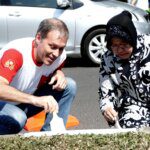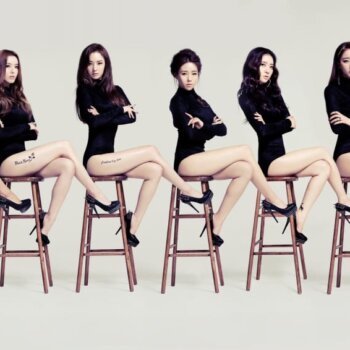Other than starring for films, TV series, variety shows or advertisements, what could famous people do to heap up wealth? This pyramid presents the five most common ways by their relevance to the fame that a Chinese star has accumulated through his or her career.
1. Business Related to the Entertainment Industry–Start one’s own studio
- Invest in films, TV series
- Produce films, TV series
- Discover and promote new actors/actresses
Starting one’s own studio not only include arranging the actors/actresses’ work with more mobility, but also include various developing strategies including promoting actors/actresses’ in the younger generation, investing in or even producing films or TV series, and even selling books. These business often help to promote the owner in they have the closest relation with the owners’ original career.
Photo retrieved from the official Weibo account of Fan Bingbing’s studio
One of the most successful studios is Fan Bingbing’s studio, which she admits that brings her more profit than her job as an actress back in 2008. According to Forbes, Bingbing Fan’s annual income has reached $20 million in 2015.
Other example: Lin Xinru, Su Youpeng, Li Bingbing, Yang Mi.
A less common way is becoming a shareholder in the carrier companies in the entertainment industry, which requires both economic strength and profound influence in the show business.
2. Online store
Lots of stars choose to gather their entrepreneurial gold by opening stores online, mostly through the Taobao marketplace platform, selling products that cannot be put into one category by even the most reasonable person.
Some choose to sell their second-hand clothes or accessories in these stores for charity. Jiang Yiyan, an outstanding Chinese actress, started her Taobao store in 2009 and put all the profits in charity. Her merchandise include evening dresses she wears in performances or to film festivals (for instance, dress from Ports, approximately $830) or her backpack that accompanies her in charitable events(approximately $13).
Dress from Ports, Yiyan Jiang in her drama play July and Ansheng, image retrieved from Yiyan Jiang’s Taobao store
Some stars treat their online store as real business by collaborating with certain brands of facial masks or cosmetics or start their own online brand.
Similar to the restaurant businesses, what make these online stores different from the vast sea of counterparts is the identity of the presumed owner. “The foremost benefit to have Ms. Xu as our leader is that Ms. Xu herself ensures the online store’s survival at the initial stage,” said the operator who is responsible for the accessory store of Xu Jinglei, one of the most famous female director, actress and writer in China in Iwshang’s interview.
Lauched in 2010 with Xu Jinglei’s successful movie Go Lala Go, the store has now grow into one of the most popular stores in Taobao’s Star Lounge, which consist of 326 stores opened by famous Chinese stars. The best sale in her online store is a pair of silver ear buds, which has been purchased 42,585 times as of June 2015.
Taobao poster collaborated with Xu Jinglei’s Film Dear Enemy, image retrieved from Xu Jinglei’s Taobao store
3. Restaurant business/bar business
Purchasing second-hand clothes from stars could be an indirect way to gain the kind of intimacy desired by fans, but the possibility of bumping into a star while having a casual dinner is definitely a catch for average people.
Ren Quan, a successful star/entrepreneur who has stepped into the restaurant business since college, accompanied by Li Bingbing and Huang Xiaoming (both listed in the 2015 Forbes China Celebrity List), started a hotpot restaurant named Re La Yi Hao in 2014.
This restaurant has over 1000 comments and an overall rating of 4.5 out of 5 on Dianping.com (Chinese version of Yelp).The average cost per person in Re La Yi Hao hotpot restaurant is around $20. In a year, three sub branch restaurants of Re La Yi Hao opened in Beijing.
A fans kissing the cardboard of Ren Quan, image retrieved from the official Weibo account of Re La Yi Hao
Having a star as the owner alone does not seem enough to assure the success of a restaurant or a bar. Sun Nan’s Dutai restaurant, Zhao Wei’s Le Fu restaurant, Nie Yuan’s Qian Restaurant all went out of business after several years’ struggle. Comments showed that customers often had higher expectations on such business for they trusted the taste of the stars and would probably accept a comparatively higher price as long as the service/product fits it. For those who failed, their business were either too pricey and at the same time not satisfactory, or just simply did not went out well as a regular business– the reasons for average restaurant bar to go down counts for the businesses under celebrities’ names too.
4. Fashion brand
A Xin in STAYREAL’s Avenger edition, photo retrieved from STAYREAL’s official Weibo account
STAYREAL is probably one of the most wanted T-shirt brands for young Chinese people both for the identity of its co-founder A Xin, the lead singer in famous Taiwanese alternative rock band Wu Yue Tian and for the high quality and delicate design of the clothes made possible by the other co-founder Bu Er Liang, a famous illustrator and designer in Taiwan.
Started from 2007, STAYREAL has opened 26 stores in mainland China, Hong Kong and Taiwan.
Other fashion brands owned by stars:
NPC(New Project Center) by Li Chen, Pan Weibo
STAGE by Luo Zhixiang
CLOT by Chen Guanxi
5. Areas of interest
It is not a rare phenomenon to see a star making profit by selling products to the customers in which the majority are their fans. For those who choose to start their business without much support from their gained fame, however, the business act might be more challenging.
For instance, Nicholas Tse, a famous Hong Kong singer/actor, started Post Production Office Limited in 2003. The company was the only post production company that relies solely on digital technology in China at that time and 22-year-old Nicholas Tse put almost every penny he earned into the business. The success of Post Production Office Limited is seen through its participation in these movies: Bruce Lee My Brother(2010), Hot Summer Days(2010), 1942 (2012), A Simple Life(2012). The annual profit of PPOL has reached $15 million since 2012.
“This is really intense for me. Maybe because this is my first time to show up as an entrepreneur, in front of the crowd. What is really odd is that I’ve been doing this most of my life.”
“I do feel that I am talking to another caliber. I’m left out.”
Quitted school as a tenth grader, Tse encouraged the college students to get through it and get the diploma that he would be willing to trade “all the wealth and so called fame and glory” that he had right now for during his speech in HKUST.
It is not hard to figure out that the relevance to the fame that a Chinese star has accumulated through his or her career is negatively related to the feasibility of their business. How the fame shall be used actually depends on the kind of business that a star chooses to start. The name of the star might be the cornerstone of success in online second-hand clothes store, but it also might worsen a customer’s dining experience when he/she has higher expectation.
Even for the stars, it takes great effort and strength to make the transition to an entrepreneur. Without the entrepreneurial spirit, the fame might be a burden instead of help (see Lin Chih-ying‘s case: selling beverages as health care products).



































